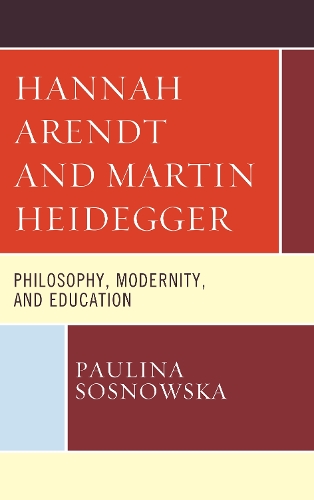
Hannah Arendt and Martin Heidegger: Philosophy, Modernity, and Education
(Paperback)
Available Formats
Publishing Details
Hannah Arendt and Martin Heidegger: Philosophy, Modernity, and Education
By (Author) Paulina Sosnowska
Bloomsbury Publishing PLC
Lexington Books
30th November 2022
United States
Classifications
Professional and Scholarly
Non Fiction
Physical Properties
Paperback
256
Width 152mm, Height 228mm, Spine 19mm
376g
Description
The tragedy of totalitarianism, one of the most important turns in the modern philosophy and history of the West undergirds the intellectual relationship between Martin Heidegger and Hannah Arendt. The rise of totalitarianism caused the disruption of traditional metaphysical and political categories and the necessity of a painstaking forging of new languages for the description of reality.
This book argues that Arendts answer to Heideggers philosophy, intelligible only within the wider context of both thinkers struggles with the philosophical tradition of the West, also opens up a new horizon of conceptualizing the relationship between philosophy and education. Paulina Sosnowska develops Arendt's thesis of the broken thread of tradition and situates it in the wider context of Heideggerian philosophy and his entanglement with Nazism, and consequently, questions the traditional relationship between philosophy and education. The final parts of this book return to the problem of dialogue between philosophy, thinking, and university education in times when the political and ethical framework is no longer determined by the continuity of tradition, but the caesura of twentieth-century totalitarianism.
Reviews
A highly informative and innovative journey through complex relations between philosophy and politics, where the density of philosophical argument is interwoven with accounts on the difficult relations between Arendt and Heidegger: two eminent thinkers who took dramatically different positions against the most tragic challenge of the twentieth century.
Against this background, Paulina Sosnowska traces the transformations of the pedagogical promise of philosophy, from that of freedom in ancient paideia, through individuality in modern Bildung, to autonomy in Heideggers fundamental ontology. Hannah Arendt, as being faithful and unfaithful to Heidegger, initiates a new version of that promise. Convincingly interpreted as foretelling Foucaults and Agambens critique of biopolitics, she calls for critique and thinking as disruptive to metaphysical and political totality. Weak as it appears to be, thinking has an immanent educational and ethical power, even if it does not have an immediate impact on social reality a message that must be read as significant in the time when temptations to totalitarianism re-emerge globally. -- Tomasz Szkudlarek, University of Gdansk
Paulina Sosnowskas Hannah Arendt and Martin Heidegger. Philosophy, Modernity, and Education is an important and intellectually stimulating contribution to the understanding of the philosophy of education. Sosnowska brilliantly shows the importance of Arendt's fundamental understanding of the unpredictability and irreversibility of human action, which encompasses the notion of Bildung. By unearthing the ontological implications of education, the question of the philosophy of education becomes a question of a new beginning. If archein means to start, to lead, or even to govern, then we can say with Heidegger and Arendt that this is not only the beginning, arch, but also the primordial sense of control that flows from the beginning and is influenced by the power of the source (Quellkraft) which forms arch and stimulates us with our (self)understanding (Sichverstehen) and acting (prattein). -- Andrzej Wierciski, Warsaw University
Sosnowskas work on Heidegger and Arendt helps us understand what awaits thinking among the ruins and remains of broken promises made in the name of education by philosophy. Indeed, we are left to wonder what philosophy would have to become to dare any more such promises. -- Ramsey Eric Ramsey, Author of Leaving Us to Wonder: An Essay on the Questions Science Cant Ask, Arizona State University
Paulina Sosnowkas book Hannah Arendt and Martin Heidegger: Philosophy, Modernity and Education is a promise of thinking "from this world." With interpretative sensitivity, Arendts relationship to Heidegger is systematically elaborated and reflected in its stance toward the educational-philosophical tradition. This is a book that reorients the educational mission of philosophy; it is undoubtedly a major academic achievement. -- Christiane Thompson, Goethe-Universitt Frankfurt
Author Bio
Paulina Sosnowska is assistant professor at Warsaw University.
